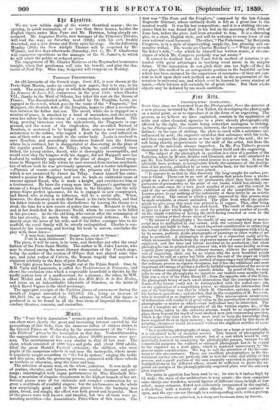PARISIAN THEATRICALS.
An old favourite of the French stage, Louis XI., is now shown at the Porte Saint Martin, under an entirely new aspect, that is to say, in his
youth. The action of the play in which he figures, and which is entitled La Jeunesse de Louis XL, commences in the year 1441, when Charles VII., thanks to the Maid of Orleans, has taken his seat on the throne of France. The discontented nobles, headed by the Dauphin, Louis, are engaged in the revolt, which goes by the name of the " Praguerie," but Margaret, the Scottish wife of the Dauphin, hopes to effect a reconcilia- tion between the father and son. The escort, while she is engaged on a mission of peace, is attacked by a band of marauders, and she merely owes her safety to the devotion of a young archer, named Raoul. The king, proving victorious over the malcontents, the Praguerie is sup- pressed, and the worst of the ringleaders, the so-called Bastard of Bourbon, is sentenced to be hanged. Here arises a new cause of dis- satisfaction to the nobles, who regard a death by the cord inflicted on one of their order as an insult to the entire body. Louis is resolved to save Bourbon, and accordingly introduces himself into the fortress where he is confined, but is disappointed at discovering in the place of the regular guard, Jamet du Tillay, whom he could certainly have bribed, the young archer, Raoul, who is thoroughly incorruptible, and would even slay the tempter with his dagger, did not Margaret save her husband by suddenly appearing at the place of danger. Raoul recog- nizes in Margaret the lady whom he once rescued from lawless assailants, -but of whose rank he was previously ignorant, and a tender intelligence —Platonic of course—arises between the princess and her preserver, which is not unnoticed by Jamet du Tillay. Jamet himself has enter- tained a passion for Margaret, and now he finds an additional cause of rancour against Raoul, who is made a knight, and overthrows him at a tournament. He lures the young man into Margaret's apartment by means of a forged letter, and betrays him to the Dauphin ; but the wily prince feigns perfect ignorance, for he is engaged in new conspiracies, and Raoul, who is rising in influence, will be a useful ally. When, however, the discovery is made that Raoul is his twin brother, and that his father intends to punish his disobedience by leaving the throne to a rival, the time for a new course of policy has come. Margaret is dying, and at her death-bed he discovers Raoul, whom he causes to be killed in his presence. As for the old king, who enters after the commission of this last atrocity, he meets him with unequivocal defiance. He has merely slain the lover of his wife, and if his father consigns him to the scaffold, the royal family will be utterly extinguished. Charles is con- vinced by his reasoning, and bowing his head in sorrow, concludes the play with these lines-
" A mon tour, maintenant ! frappe done, cceur de bronze ! C'est la mon chatiment! Tu seras Louis Onze !"
The piece, it will be seen, is in verse, and therefore not after the usual fashion of the Porte Saint Martin. The author is M. Jules Lacroix, who may be classed among the more literary dramatists of the French stage, being the author of the version of ffdipus that was played some time ago, and joint author of Valeria, the Roman tragedy that acquired a transient celebrity in the days of poor Rachel. Two light pieces have been brought out at the Palais Royal. One, by MM. Darin and Laurencin, is called Les Turltnutaines de Prangoise, and shows the confusion into which a respectable household is thrown by the madly jealous love of a maifi-servant for a pieman ; the other, by MM. Marc Michel and A. Choler, is called Les Meli Mao de la Rue Meslay, and turns on an indescribable labyrinth of blunders, in the midst of which Ravel Vigues is the chief personage. The aggregate receipts of the Parisian places of amusement during the month of August amounted to 643,881f. 15c., being an increase of 181,207f. 70e. on those of July. The advance by which this figure is produced is to be found in all the four items of Imperial theatres, se- condary theatres, concerts, and curiosities.


























 Previous page
Previous page